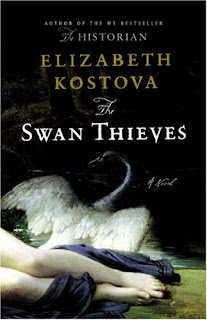The Swan Thieves - Elizabeth Kostova
Caught up in his own interior world, Robert becomes increasingly distant from the realities of the present-day, from his wife and children, neglectful of his duties as a father and as an art tutor. When he attempts to attack a canvas of Leda in the National Gallery however, he is taken into care and hospitalised for psychiatric examination. It’s here that the tone of McGrath is most evident, the psychiatrist Marlow becoming overly involved in his examination into Robert Oliver’s past, appearing a little unstable and unreliable himself.
As the novel develops however the structure and themes become more recognisably those that Kostova worked through in The Historian; the influence of the past, old documents and testimonies interweaved into the narrative. Here it’s letters detailing a love affair between Béatrice de Clerval and her uncle Olivier Vignot, two nineteenth century French Impressionist painters, that could hold the key to the strange behaviour of the modern day painter. And what could be the connection between Olivier Vignot and Béatrice de Clerval, a modern-day unfashionably Impressionist but brilliant painter with 19th century anachronisms in his work?
Unfortunately what is also recognisably a characteristic of Kostova is just how long drawn-out the uneventful story is by the overly-contrived fractured narrative. The psychiatrist Marlow has the money and leisure to travel around interviewing people who he really has no business contacting, people who end up being only too willing and old-fashioned enough to reminisce about Robert in the form of written instalments that they conveniently send to him on a regular basis.
Sadly, the resolution fails to convincingly account for Robert’s mad obsession, and the fact is that these reminiscences, mostly romantic reflections of women in deep admiration for the rugged, silent, mysterious, lovesick artistic genius that is Robert Oliver, are deeply tedious, all of them (including also the 19th century letters and the modern-day psychiatrist) narrating in the same tone of voice, and exhibiting the same characteristics – mildly prudish, prone to instant romantic attraction and deeply jealous. None of the author’s failings prevented The Historian from being a huge success however, so there’s no reason to think that The Swan Thieves won’t be just as popular.




Comments
Post a Comment